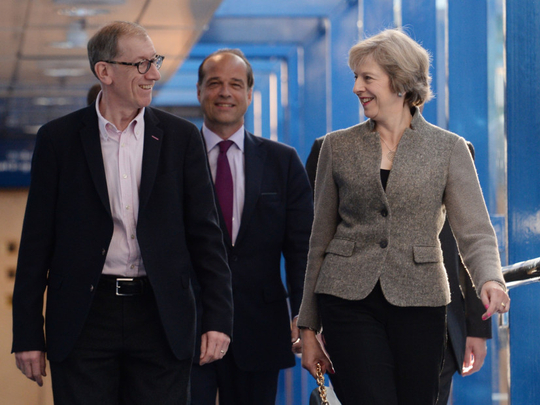
There are definite advantages, if you’re a Tory, to the existence of British Prime Minister Theresa May. The party, despite all the best efforts of its big beasts, is still upright and in charge; and the boiling personal hatreds within Labour appear to have no parallel among Conservatives, even though this can’t be true — animus hasn’t been resolved but simply buried under pragmatism, like nuclear waste.
The party’s internal contradictions are treated as a natural part of politics. Three months ago, you knew this party by its trail of dead: it would have been inconceivable in summer that they could return so fast to being boring. May has given them the gift of tedium. Their gratitude to her is palpable.
Nevertheless, there are Conservatives with questions May cannot answer. If her first gambit, to bring back grammar schools, initially seemed rather wild and random, it has sharpened into a picture: she took the referendum result as a mandate to return us to the 1950s. Doubtless, for some leave voters, that’s what they wanted: a Britain of yore, where lives were better, richer and more fulfilling because the rest of the world left us alone.
But that isn’t the full picture of Conservatism, which has since 2010 drawn its energy from being the opposite of conservative. David Cameron, George Osborne and Michael Gove were radical modernisers, creating a gruesome future in which commerce was king and the state had been wound down to food stamps and fire engines; but it was a future, nevertheless. They gave a sense of having understood modernity, and of being not just ready for it but exhilarated by it. Their worldview was wrong and their excitement unnerving, Osborne’s in particular, with his casual destruction of the social safety net, his maniacal faith in markets, his feverish promises — manufacturing, march of the makers, running a surplus — that never materialised. Yet t They fulfilled a need in the party, and made a home there for people who weren’t nostalgic.
There are still plenty of free trade fundamentalists in the party, but the territory has been annexed by the Brexiteers, in whose hands it sounds either unhinged (a neo-imperialist vision, in which everyone wants to trade with us because we’re simply better than them) or incredibly flaky (a messy, hand-waving “It’ll be fine!” approach, embodied by Boris Johnson, who can inspire many things but not — even in his allies — confidence).
Mindless self-assertion
May, in her first speech to conference, attempted to harness some of this buccaneering Brexit spirit. “We don’t need, as I sometimes hear people say, to ‘punch above our weight’. Because our weight is substantial enough already.”
It was nothing more than a big I Am: mindless self-assertion. Furthermore, May’s social agenda is far more toxic to her own youth wing than it is to the members of Momentum. Young Conservatives don’t want equality commissions and redistributive taxation. They want low taxes, a small state, personal freedom as defined by having no responsibility for one another: all those pillars of right-wing thinking that they take to be 21st century but were actually thrashed out by Ludwig von Mises.
For us on the left, the problem with May is that she neutralises the pursuit of equality by talking about it with no real intention of making it happen; for those on the right, the talk itself is anathema. They would get more from a Compass meeting about automation, a future without work and the basic citizen’s income — which at least is a new problem — than they would from the rather tired conference oratory about how to tend to the poor while at the same time getting them to buck up their ideas. There is a chimeric thinness to May’s vision of the next two decades that is rather depressing, like getting close to a landscape only to find it has been painted on a sheet of plywood. Let’s say her grammar school plan were to work — that, contrary to all the experience and evidence, the brightest and best flourished in a segregated school system, got to a world-beating university, emerged with stunning qualifications. Then what? All May’s rhetoric hangs off a world of bank managers and civil servants, a society of old certainties where to be middle class meant to be secure and comfortable, and to ascend to those ranks was reward in itself.
That isn’t really true any more for the middle classes under 30, who face a precariousness — vague terms of employment, unaffordable housing, chronic debt — that old politics would associate with the underclass The question of how to create a knowledge economy, how to educate a populace for the next era of work, how to ensure that the changes we know are coming make life easier and not harder: these are all left unanswered.
Terrifying lacuna
Then there is the frankly terrifying lacuna where her environmental plan should be: there are, of course, climate change deniers on the right, and the American alt-right pretty much defines itself by its ability to meet science with splenetic outburst, and consider itself the victor.
But there are perfectly educated Conservatives too who want to see some meaningful, coherent answers to problems they can see are interrelated: how to meet climate change targets, how to generate more energy and liberate ourselves from reliance on fossil-richer countries, how to exist at the frontiers of new technology, how to spread skilled jobs across the country. They will want to at least hear conversations about renewable energy, even if they wouldn’t expect a concrete plan.
But this ground is terrifying for the prime minister, who knows that those who blame Europe’s red tape for hardship are the same people who blame wind farms for illness; that the decision to leave the EU, even if it had nothing explicit to say about the environment, would not have been taken by anyone who took environmentalism seriously.
There is not much here for the optimistic Tory. All eyes are currently on May’s Brexit plan, and with good reason: it has the greatest consequence in the short and medium term, it is the obvious site of conflict, and it’s the most fun to watch (albeit a devastating sort of fun). But there are deeper problems — if not for the country, then for the party. What is its offer to the hopeful? How is it addressing its modernisers? Where is its — big-M and little-m — momentum?
— Guardian News & Media Ltd
Zoe Williams is a Guardian columnist.



_resources1_16a45059ca3_small.jpg)






